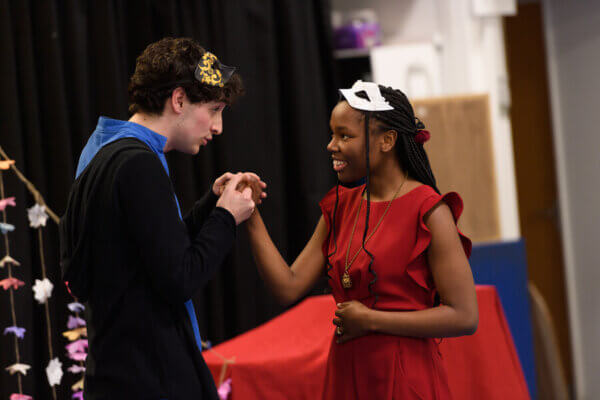Writer: William Shakespeare, edited by Robin Bellfield
Director: Philip J. Morris
The Royal Shakespeare Company is currently touring widely a sub-90 minute version of Romeo and Juliet, aimed at 7-13 year olds and taking in schools and theatres before settling into a run at Stratford. The first thing to be said in favour of the production is that is it is astonishing that it held the attention of the audience, many very much at the younger end of that age range, for so long. Also Philip Morris clearly sees the divided nature of the play: up to Tybalt’s death it can be played almost as a comedy, thereafter it’s deadly serious.
It’s difficult to assess how many of the lines got across to the young people in the audience. He sets a rapid pace which, together with the tendency to shouting and horseplay, may cause problems. But the Capulets and Montagues are clearly distinguished, with clever colour coding in the simple travelling set and costumes – there’s also a nice explanatory section at the beginning.

The cast of eight professionals, plus an eager group of local youngsters, takes on most parts. The older generation of Capulets and Montagues is severely reduced and the various servants, pages and officers disappear as individuals, though quite a few of their lines remain, many spoken by very confident locals.
Set pieces are handled well. The ball scene plays a brief variation on “My heart stood still” before Juliet’s cello solo foregrounds her neatly; the death of Tybalt is genuinely dramatic; and Juliet’s bed becomes a flower-decked tomb with minimum fuss. The problem is just how comic to make the comedy. Robin Bellfield’s script is fine, with rapid-fire interlocking between various scenes (the Prologue and the opening scene, for instance), but Morris is inclined to play every character save Juliet and, to an extent, Romeo for laughs or over-the-top bluster. The characters of the Nurse and Mercutio virtually disappear in plain sight and more could have been expected of possibly the best-known member of the cast, Orlando Wells as Friar Lawrence, than an amiable Irish gardener.
Juliet is the only character to survive unscathed. Zensi Alleyne brings authenticity to the part and even gets to remind us of the power and poetry of “Gallop apace, you fiery-footed steeds…” Campbell Wallace grows into Romeo, but it’s only late on that we can take him really seriously: he tackles his problematic fight scenes well, though.
The delicate balance in a production of this sort is disturbed if you feel that jokey episodes are more to indulge the grown ups than to entertain the little ones. Now and again this presents itself here. Romeo on a sweet-snaffling run is encouraged by the chortles of adults and, worst of all, the Apothecary who sells Romeo the poison is presented as a caricature, resulting in guffaws from the adults in the audience just before the multiple deaths touch our hearts.
Reviewed on 2nd March 2024, and touring.

